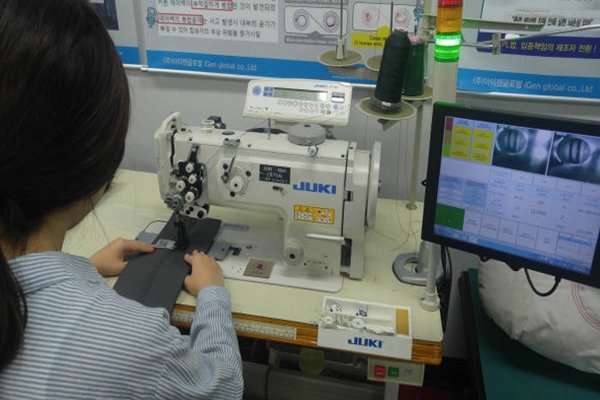South Korean small and medium company has developed a technology that minimizes defects of airbags for cars and looks for misuse of materials during sewing process and work mistakes in real-time. Although manufacturing of cars has been automated, sewing process of airbags, seats, and seatbelts is still done by manual work and this newly developed technology will prevent mistakes made by workers during manual work. This company prevents airbags from not working and from blowing up late in advance through camera sensing technology and IoT (Internet of Things) and Big Data technology and provides data that is needed to prove any defects when accidents happen.
Igen Global (CEO Cho Hoon-sik) announced on the 2nd that it has developed sewing record management system that utilizes IoT and Big Data. Defects of airbags or side airbags that are built inside of driver and passenger seats occur as upper threat and under thread are not used optimally during sewing process or when right places of threats are not ripped at the right moment due to double backstitch or threads that are thicker than standard threads. When airbags do not blow up or even when they blow up inside of seats, they do not come out of seats or blow up late if backstitch is not ripped up.
Igen Global notifies when under threads are almost used up or how much work can be done with leftover threads through ‘Dr. Sewing’ technology. Its camera sensing technology attaches barcodes to bobbin of under threads and understands the timing when threads are almost used up and provides alarms and others while stopping sewing machine at the same time.

Igen Global has added its record management system, which was recently developed, to its ‘Dr. Sewing’ technology. During work process, it manages records in real-time from initial stage of products such as seats until completion of products. It also finds out who did what work and when did that person work and prevents defects of products that occur due to sewing mistakes in advance.
This system matches and recognizes sewing machines that are installed with IoT chips with QR codes or RFID (Radio Frequency Identification) tags that are attached on seats and airbags. This system can check progress of work according to types and part numbers of airbags of models of vehicles and it shows number of backstitch and materials according to directions through a display of a sewing machine. It also collects records of work as Big Data through servers which are then shared with workers and partnering businesses. Data that is collected and analyzed is useful to analyze causes of defects when accidents occur while drivers can find out quality of products through QR codes that are attached on airbags or seats.
“Not only ‘Dr. Sewing’ technology and record management system prevent variety of accidents that may occur due to defects of airbags but they can also provide data that is needed to prove who is at blame according to product liability (PL) when accidents happen.” said CEO Cho Hoon-sik of Igen Global. “As automotive safety technologies are becoming more enhanced, we are currently discussing with a global airbag manufacturer called Autoliv and automotive manufacturers such as GM, Mercedes-Benz, and Hyundai Motor Company about supplying our technology and system.”
Staff Reporter Park, Taejoon | gaius@etnews.com